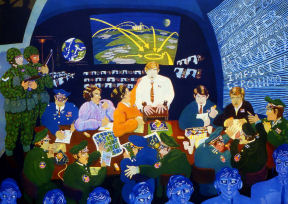The war’s legacy of lies continues in an official commemoration that stands history on its head. 2015 marks the third year of a fifteen year, congressionally designated commemoration of the U.S. empire’s monstrous war in Vietnam.
It is also the fortieth anniversary of the final defeat and withdrawal of U.S. military forces.

The enormity of the U.S. aggression against a small country 8,000 miles away is masked behind a well orchestrated campaign to maintain the legitimacy of American militarism and ignore the horrible destruction the U.S. war machine inflicted on the nations of Indochina.
This is accomplished through a sleight of hand which turns who is victim and who is perpetrator on its head. Seen through the imperial gaze, the Vietnam war is portrayed as a failed and flawed undertaking, but with a pathos projected for “our boys” who fought honorably and are still suffering the consequences of the experience through PTSD and homelessness. But ignores what was suffered by the Vietnamese.
Most Americans can quickly offer the official U.S. military death toll for the war, but if you rudely ask how many perished on the other side, one is usually met with a blank stare. Guesses usually range in the hundreds of thousands, a thought-less estimate that is far from the actual number that reaches upwards of three million. Try it on a friend or family member.
Noam Chomsky wrote that this figure would be like asking a German citizen how many people were put to death in the Nazi Holocaust and hearing an answer that was 90 percent less than the actual total.
The Vietnamese resistance that fought and beat the Japanese and French colonial regimes must have seemed Lilliputian to the U.S. war machine, but the new invaders suffered as ignoble a defeat as their predecessors. Following the exit from Saigon 40 years ago, the challenge confronting the war makers, driven equally by a psychosis of power and the need to maintain a military-based economy, was how to resuscitate popular support for the empire’s endless wars.
Quick, cheap victories (except to those who were in the way) in Grenada, Panama, and the first Persian Gulf War were expected to erase what the militarists dubbed the Vietnam Syndrome, the public distaste for overseas adventures. Those projections of American power in the 1980s and ’90s, combined with the events of September 11, 2001, set the stage for popular support for two new wars, both of which are now seen universally as military and policy disasters. But as with Vietnam, they are seen as disasters for the invaders, not for the countries they destroyed.
That each of these wars, like every conflict the U.S. has been involved in, was based on lies is lost on most Americans. Many will offer obeisance to the dominant narrative as expressed in the five Congressionally-mandated objectives of the 15 year observance since that is the only one most will hear.
To no one’s surprise, liberal networks such as PBS and NPR (best designated as Pentagon Bull Shit and National Pentagon Radio) echo the militarist tropes no less so than the mainstream networks and cable outlets.
The five official points of commemoration are 1) To thank and honor veterans of the Vietnam War; 2) To highlight the service of the Armed Forces and the contributions of Federal agencies and governmental and non-governmental organizations; 3) To pay tribute to the contributions made on the home front by the people of the United States; 4) To highlight the advances in technology, science, and medicine related to military research conducted during the Vietnam War; and, 5) To recognize the contributions and sacrifices made by the allies of the United States during the Vietnam War.
This stupefying, blinkered laundry list of acts considered worthy of honors, if examined even with the slightest honesty, is more easily recognized as the template for the military machine that killed millions of Indochinese and destroyed a society. Yes, babies were killed.
What has been transmutated from the horrors perpetrated into props for militarism and nationalism, calls out mightily for their refutation. We offer this section as what is hopefully a large body of literature and actions that will function as the counter-narrative to the official lies.
The U.S. is often described as a dying empire, but even a dying dragon can still wreak destruction with swipes of its tail. We, too, are Lilliputian compared to the dominance of the rulers which control the major means of communication, but like the Vietnamese who cut the legs off the great beast, we go at our task with similar resolve to hobble the dragon.
We dedicate this section to those who took part in the resistance to U.S.’s bloody slaughter: the Vietnamese, anti-war GIs, and the domestic anti-war movement.
A Vietnam Resource Page is on our site at: fifthestate.org/archive/vietnam-resource-page.
